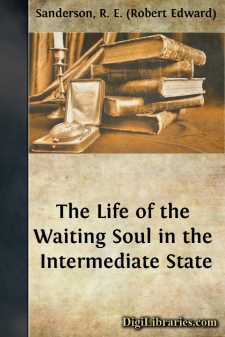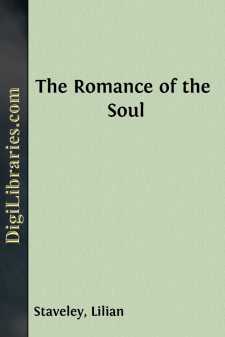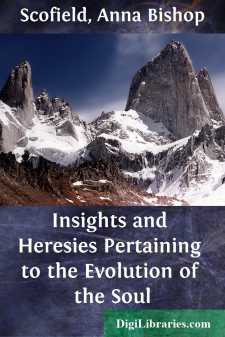Categories
- Antiques & Collectibles 13
- Architecture 36
- Art 48
- Bibles 22
- Biography & Autobiography 813
- Body, Mind & Spirit 142
- Business & Economics 28
- Children's Books 15
- Children's Fiction 12
- Computers 4
- Cooking 94
- Crafts & Hobbies 4
- Drama 346
- Education 46
- Family & Relationships 57
- Fiction 11828
- Games 19
- Gardening 17
- Health & Fitness 34
- History 1377
- House & Home 1
- Humor 147
- Juvenile Fiction 1873
- Juvenile Nonfiction 202
- Language Arts & Disciplines 88
- Law 16
- Literary Collections 686
- Literary Criticism 179
- Mathematics 13
- Medical 41
- Music 40
- Nature 179
- Non-Classifiable 1768
- Performing Arts 7
- Periodicals 1453
- Philosophy 64
- Photography 2
- Poetry 896
- Political Science 203
- Psychology 42
- Reference 154
- Religion 513
- Science 126
- Self-Help 84
- Social Science 81
- Sports & Recreation 34
- Study Aids 3
- Technology & Engineering 59
- Transportation 23
- Travel 463
- True Crime 29
The Life of the Waiting Soul in the Intermediate State
Categories:
Description:
Excerpt
“I would not have you to be ignorant, brethren, concerning them which are asleep.”—1 Thess. iv. 13.
There are moments in the lives of every one of us, when the mind is irresistibly drawn on to wonder what our own personal future shall be, as soon as life is over and death has overtaken us. We cannot help the speculation. However bound by present duties and absorbed in present interests, often, in quiet hours, in times of solitude or bereavement, or under the sense of failing hopes or failing health, in seasons of sorrow or of sickness, the mood takes hold of us; and it may be, we know not why, our eyes turn with an anxious and a wistful look towards that inevitable end which is surely coming upon us.
At such moments we ask ourselves, what will my lot be when the hand of death touches me—even me; when all the light of life goes out, all thought of this world’s cares, all pleasant joys and hopes and desires of time sink down and fade into the chill gloom and shadow of the unknown? Such questionings, brought close home to our very selves, cannot but fill us with very anxious fears and misgivings, as we either look back upon the past, or think upon what chiefly possesses our minds and thoughts now. Indeed, many of us cannot bear this forward glance, and refuse to face it. We would fain brush the thought aside, and with some hasty utterance of vague trust, of shadowy self-comforting hope that God will be merciful, we turn sharply round and give ourselves again to the calls of the life which is about us.
In this way, we Christians, we children of God, heirs of life and immortality, learn to be terrified at death, which, as we are taught to believe, ushers us into life; learn to associate it with trembling doubt and shuddering dismay. But is this dread of death nothing else than the natural instinctive shrinking, which the warmth of life feels at the touch of its cold hand? Or is it not rather, in the case of most of us, due to some false imaginations with which religion itself—that form, at least, of religion which to-day encompasses us—has for many years possessed and imbued the minds of men? Indeed, I believe it to be so. The Christianity of to-day has too commonly accepted two untruths, which yet it holds as truths.
1. One of them is this: That death ushers the soul immediately and finally into the supreme condition which awaits the souls of men; so that, at death, the souls of good men pass at once into heaven, while the souls of bad men pass at once into hell; in other words, that the final and irrevocable severance between the just and the unjust takes place at death. Believing this, men have lost all faith in an Intermediate State between death and the Day of Judgment. That intervening sojourn of the soul has virtually dropped out of recognition in the popular Christianity of the day, and is quite ignored. If you walk through any resting place of the bodies of the dead, into your own churchyards and cemeteries, you will, not seldom, find inscriptions upon tombs, which express the confident assurance that one, whose death is recorded, has already passed into heaven; that another has now become an angel of Light, or is singing the praises of God before the throne, is, in short, in the full present enjoyment of consummate and final bliss. Thus it is that the Intermediate State between death and the final condition of happiness in heaven, which can only follow the Day of the Resurrection, is quite forgotten and overlooked.
2. And the second untruth, which is closely connected with the first, is this: That there are but two classes of those who pass hence and are no more seen; classes sharply distinguished, clearly outlined,—on the one hand, of those who at death go straight to heaven, and, on the other, of those who at death go straight to the place of final torment. If then these are the only two clearly marked and sharply defined alternatives, it follows that, whensoever we dare not be sure of any one soul at death that it was good enough certainly for heaven, there is nothing for it but to fear that the worse doom awaits it and that it is lost. For if it is not, at the moment of death, pure enough or good enough for heaven, into which there “shall in no wise enter anything that defileth, neither whatsoever worketh abomination, or maketh a lie,” that soul, according to this false belief, is lost. Yet, in fact, what do we see within us and around us, as we honestly look into our own lives, and upon the lives both of the best and of the worst among us? We see this, and we are convinced that we are not mistaken, that even among the most marked extremes of good men and evil men, few even of the best are so free from stain or fault as, at death, to be certainly fit for heaven, and few so vile and degraded as not to have still some good in them. And between these two extremes there are multitudes of mixed characters, in part good and in part bad. Among these, of whom we know that they are full of worth yet full of imperfections too, we count so many who are most dear to us, many the companions of our lives, our kindred, and acquaintances, and cherished friends, whose failings and whose virtues we know so well, of mixed and imperfect character, too frail for heaven, too good, too lovable for hell, partly good and partly not good, strong and also weak, marred with inconsistencies, and often for these very inconsistencies the more dear to us, of whom, so truly have we loved and even honoured them, it seems almost like an outrage upon their memory to bring ourselves to think that there was just so much of evil in them and just so little good, as would suffice to turn the balance against them and thus fix, at the moment of their death, their final doom....












